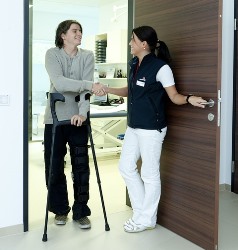How to Select the Right LPN or LVN Course Near Philadelphia Pennsylvania
 Now that you have decided on a rewarding career in the field of nursing, it's imperative that you select a Licensed Practical Nurse (LPN) school near Philadelphia PA that will provide the right instruction. If you reside in Texas or California, then you will be searching for a Licensed Vocational Nurse (LVN) school instead. There is no distinction, other than the names, between an LPN and an LVN. They both undertake the same job functions and work in medical facilities under the guidance of Registered Nurses (RN) or Doctors. But their responsibilities do differ depending on the state they practice in, which we will cover in the next section. When initiating their search for schools, many prospective nursing students begin with the ones that are the nearest to their residences or that are the least costly. Even though price and location are important considerations, they are not the only qualifications that you should base your selection on. Other concerns, such as if the schools are accredited or have high pass rates on the licensing exam are very important too. There are additional questions that you should ask prospective schools before enrolling in a LPN or LVN training program that we will address later in this article. But to start with, let's have a look at the role of an LPN and what is involved in the education and licensing process.
Now that you have decided on a rewarding career in the field of nursing, it's imperative that you select a Licensed Practical Nurse (LPN) school near Philadelphia PA that will provide the right instruction. If you reside in Texas or California, then you will be searching for a Licensed Vocational Nurse (LVN) school instead. There is no distinction, other than the names, between an LPN and an LVN. They both undertake the same job functions and work in medical facilities under the guidance of Registered Nurses (RN) or Doctors. But their responsibilities do differ depending on the state they practice in, which we will cover in the next section. When initiating their search for schools, many prospective nursing students begin with the ones that are the nearest to their residences or that are the least costly. Even though price and location are important considerations, they are not the only qualifications that you should base your selection on. Other concerns, such as if the schools are accredited or have high pass rates on the licensing exam are very important too. There are additional questions that you should ask prospective schools before enrolling in a LPN or LVN training program that we will address later in this article. But to start with, let's have a look at the role of an LPN and what is involved in the education and licensing process.
It Only Takes a Few Minutes to Start Your LPN or LVN Career Below
Job Duties of an LPN or LVN

Licensed practical nurses (LPNs) are an important part of the healthcare team, supporting doctors and nurses in caring for patients of all ages. LPNs work closely with registered nurses (RNs) and physicians to provide patients with basic nursing care. An LPN’s duties can vary slightly depending on the healthcare setting and the state in which they work. For example, some states do not permit LPNs to administer medication or start IV drips. In other states, experienced LPNs are able to supervise and manage less-experienced nurses or nursing aides. Some of the typical duties of an LPN might include:
- Monitoring patients
- Taking patient vital signs and histories
- Performing routine assessments, such as checking blood pressure
- Changing bandages
- Inserting IVs or catheters
- Listening to patients’ concerns and reporting back to RNs and doctors
- Ensuring patients are comfortable
- Helping patients bathe or dress
LPNs can also work in a wide variety of healthcare settings, including Philadelphia PA hospitals, doctor's offices and urgent care clinics. Due to an aging population, there is a growing need for LPNs in long-term care, such as rehabilitation centers, residential treatment centers and hospice. Most LPNs work in nursing and residential care facilities.
LPN and LVN Training
If you want to become a licensed practical nurse, you must first complete one year of coursework to earn a certificate or a diploma in an accredited LPN/LVN program. Most states have dozens of accredited colleges, technical schools, and hospitals that offer LPN/LVN programs. The first consideration you must make when becoming an LPN is which school you will attend. This can be a difficult choice. When choosing a school, choose one which is accredited by a nationally recognized accrediting agency. One well-known accrediting agency is the Accreditation Commission for Education in Nursing. After satisfying the LPN program coursework and grade requirements laid out by your state’s Board of Nursing, you will be eligible to take the NCLEX-PN, or the National Council Licensure Examination. This exam is mandatory for all LPN/LVN's in the U.S. and can be scheduled through the National Council of State Boards of Nursing.Attending LVN and LPN Online Courses
 Attending LPN schools online is emerging as a more preferred way to obtain training and earn a nursing certificate or degree in Philadelphia PA. Many schools will require attending on campus for a component of the training, and virtually all programs require a certain amount of clinical rotation hours performed in a local healthcare center. But since the remainder of the training can be accessed online, this option may be a more convenient answer to finding the free time to attend classes for many students. Concerning tuition, many online degree programs are less costly than other on campus choices. Even supplementary expenses such as for commuting and study materials may be lessened, helping to make education more easily affordable. And many online programs are accredited by U.S. Department of Education recognized organizations. And so if your job and household commitments have left you with very little time to pursue your academic goals, it could be that an online LPN training program will make it easier to fit a degree into your hectic schedule.
Attending LPN schools online is emerging as a more preferred way to obtain training and earn a nursing certificate or degree in Philadelphia PA. Many schools will require attending on campus for a component of the training, and virtually all programs require a certain amount of clinical rotation hours performed in a local healthcare center. But since the remainder of the training can be accessed online, this option may be a more convenient answer to finding the free time to attend classes for many students. Concerning tuition, many online degree programs are less costly than other on campus choices. Even supplementary expenses such as for commuting and study materials may be lessened, helping to make education more easily affordable. And many online programs are accredited by U.S. Department of Education recognized organizations. And so if your job and household commitments have left you with very little time to pursue your academic goals, it could be that an online LPN training program will make it easier to fit a degree into your hectic schedule.
Questions to Ask LPN and LVN Programs
Once you have decided on obtaining your LPN certificate, as well as if you will attend classes on campus or online, you can use the following guidelines to begin narrowing down your options. As you probably realize, there are numerous nursing schools and colleges near Philadelphia Pa as well as within Pennsylvania and throughout the United States. So it is necessary to decrease the number of schools to select from to ensure that you will have a manageable list. As we previously mentioned, the site of the school along with the price of tuition are probably going to be the first two points that you will look at. But as we also stressed, they should not be your only qualifiers. So prior to making your final decision, use the following questions to see how your pick measures up to the other programs.
- Accreditation. It's a good idea to make sure that the certificate program as well as the school are accredited by a U.S. Department of Education recognized accrediting organization. In addition to helping confirm that you obtain a premium education, it may help in acquiring financial aid or student loans, which are oftentimes not available for non-accredited schools near Philadelphia Pennsylvania.
- Reputation. Check online rating companies to see what the evaluations are for all of the LPN schools you are looking into. Ask the accrediting agencies for their reviews also. Also, get in touch with the Pennsylvania school licensing authority to check out if there are any complaints or compliance issues. Finally, you can call some local Philadelphia PA healthcare organizations you're interested in working for after graduation and ask what their opinions are of the schools as well.
- Internship Programs. The most ideal way to get experience as a Licensed Practical Nurse is to work in a clinical setting. Essentially all nursing degree programs require a specified number of clinical hours be completed. A number of states have minimum clinical hour mandates for licensing too. Ask if the schools have associations with nearby Philadelphia PA community hospitals, clinics or labs and help with the placing of students in internships. Also, it's important that you choose a school that offers clinical training in the type of facility you are most interested in. For example, if you want training and experience in pediatric care, make sure that the school you choose provides adequate clinical rotation in an area Pediatric Hospital.
- Licensing Preparation. Licensing prerequisites for LPNs are different from state to state. In all states, a passing score is needed on the National Council Licensure Examination (NCLEX-PN) together with graduation from an approved school. Certain states require a specific number of clinical hours be performed, as well as the passing of additional tests. It's imperative that the school you are attending not only provides an outstanding education, but also preps you to satisfy the minimum licensing requirements for Pennsylvania or the state where you will be working.
- Graduation and Job Placement Rates. Find out from the LPN programs you are considering what their graduation rates are as well as how long on average it takes students to finish their programs. A low graduation rate may be an indication that students were unhappy with the program and dropped out. It's also important that the schools have high job placement rates. A high rate will not only verify that the school has a superb reputation within the Philadelphia PA medical community, but that it also has the network of contacts to assist students gain employment.
- NCLEX Exam Pass Rate. Once you receive your certificate or diploma, you must sign up for and pass the National Council Licensure Examination for Practical Nurses (NCLEX-PN). Enrolling in a school with at least a 75% pass rate is highly preferred. Lower pass rates may indicate that a school’s program, curriculum or instructors are ineffective in teaching its students. You can find out from the school what their passing rate is for the last 5 years, or request the information from the State Board of Nursing.
Find Out How to Become an LVN or LPN in Philadelphia
Choose the Right Philadelphia Licensed Vocational Nurse School
Choosing the ideal Licensed Practical Nurse program is arguably the most important phase to beginning a new career in the medical care field. There are various variables that you need to think about when picking a nursing school. These aspects will be prioritized differently contingent on your existing career goals, lifestyle, and financial status. As we have emphasized in this post, it is critical that you choose an LPN college and a certificate or degree program that are both accredited and have outstanding reputations within the medical community. By using our checklist of qualifying questions, you will be able to create a short list of schools to choose from so that you can make your ultimate selection. And with the right degree and training, combined with your hard work and desire to succeed, you can become an LPN in Philadelphia Pennsylvania.
PHILADELPHIA LPN OR LVN SCHOOLS | PHILADELPHIA LPN OR LVN CLASSES
